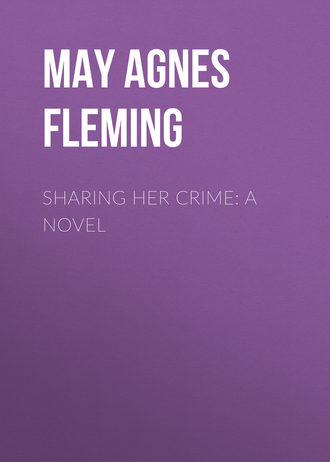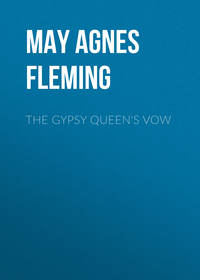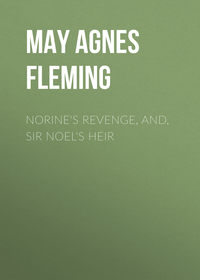 полная версия
полная версияSharing Her Crime: A Novel
A small, slight, straight, lithe figure, airy and bird-like in its motions, skimming over the floor without seeming to touch it; never at rest; but quick, sudden, abrupt, and startling in all its motions, yet every motion instinct, glowing with life. A dark, bright, laughing little face, that no one knows whether it is handsome or not, it is so radiant, so bewitching, so sparkling, so full of overflowing mirth and mischief. Short, crisp black curls, adorning the sauciest little head in the world; wicked brown eyes, fairly twinkling with wickedness; a rosy little mouth, that seemed always laughing to display the little pearly teeth. Such was the star of the evening. Reader, do you recognize her?
As she seated herself after the dance, tired and a little fatigued, Jennie Moore, a pretty, graceful girl, came up to her, saying, in a low voice:
"Oh, Gipsy, I have a stranger to introduce to you – a most distinguished one. One of the cleverest and most talented young lawyers in Washington."
"Distinguished! Now, I'm tired to death of 'distinguished' people; they're all a set of bores – ugly as sin and pedantic as schoolmasters. Don't stare – it's a fact!"
"Oh, but Mr. Rivers is not; he is young, handsome, agreeable, witty, a regular lady-killer, and worth nobody knows how much."
"Mr. – worth what?" exclaimed Gipsy, springing to her feet so impulsively that her friend started back.
"Why, what's the matter?" said Jennie in surprise.
"Nothing! nothing!" said Gipsy, hastily. "Who did you say it was?"
"Mr. Archibald Rivers, student-at-law."
"Jennie, they say I've changed greatly of late. Do you think I look anything like I did when you first saw me?"
"Why, not much. You were a tawny little fright then; you're almost handsome now," said the candid Jennie.
"Then he won't know me. Jennie, will you oblige by introducing Mr. Rivers to me under an assumed name?"
"Why – "
"There! there! don't ask questions; I'll tell by and by. Go and do it."
"Well, you have always some new crotchet in your crotchety little head," said Jennie, as she started to obey.
In a few moments she reappeared, leaning on the arm of the "distinguished" Mr. Rivers. Our Archie has not changed as much as Gipsy has done during these years, save that he has grown taller and more manly-looking. He has still his frank, handsome, boyish face; his merry blue eye and boisterous manner, a little subdued.
The indistinct tone in which Miss Moore introduced him prevented him from catching the name, but he scarcely observed; and seeing in the young lady, whose lips were now pursed up and whose eyes were cast modestly on the floor, a shrinking, bashful girl, he charitably began to draw her out.
"There is quite an assembly here this evening," was his original remark, by way of encouraging her.
"Yes, sir," was the reply, in a tone slightly tremulous, which he ascribed to maiden bashfulness.
"What a delightful young lady your friend, Miss Moore, is," continued Archie.
"Yes, sir."
"There are a great many beautiful ladies in the room."
"Yes, sir."
"Confound her!" muttered Archie, "can she say nothing but 'Yes, sir?' But the most beautiful lady present is by my side," he continued, aloud, to see how she would swallow so palpable a dose of flattery.
"Yes, sir!"
"Whew! if that's not cool! I wonder if the girl's an idiot!" thought Master Archie. Then, aloud: "Do you know you're very beautiful?"
"Yes. I know it."
A stare of surprise followed this answer. Then he continued:
"You are a most bewitching young lady! Never was so much charmed by anybody in my life!"
"Sorry I can't return the compliment."
"Hallo!" thought Archie, rather taken aback. "She's not such a fool as I took her to be. What do you think of that lady!" he added, pointing to a handsome but dark-complexioned girl, whom report said would one day be Mrs Rivers.
"Oh! I don't think her pretty at all – she's such a gipsy."
Archie gave a little start at the name. Poor Gipsy! he had quite forgotten her of late.
"Do you know," he said, "I once had a little friend called Gipsy? Your words recalled her to my memory. You remind me of her, somehow, only you are handsomer. She was dark and ugly."
"Indeed! Did you like her?"
"Ye-e-e-s – a little," said Archie, hesitatingly; "she was a half-crazy little thing – black as a squaw, and I don't think I was very fond of her, but she was very fond of me."
"Indeed, sir!" said the young lady, a momentary flash gleaming from her dark eyes; "she must have been a bold girl, rather, to let you know it."
"She was bold – the boldest girl ever I knew, with nothing gentle and womanly about her whatever."
"What did you say her name was?"
"Gipsy – Gipsy Gower. You seem interested in her."
"I am, sir – I know her."
"You do?" cried Archie, aghast.
"Yes, sir; but I like her no more than you do. She was a rough, uncouth savage, detested by every one who knew her. I had the misfortune to be her room-mate in school, and she used to bore me dreadfully talking about her gawky country friends, particularly some one whom she called Archie."
"Yes? What used she to say about him? She liked him, didn't she?" said Archie, eagerly.
"Why, no; I should say not. She used to say he was a regular fool – always laughing. She said she never knew such a greeny in all her life."
Mr. Rivers suddenly wilted down, and hadn't a word to say. Just at that moment a party of Gipsy's friends came along, and it was:
"Oh, Gipsy! Gipsy! Oh, Miss Gower! we've been searching all over for you. Everybody's dying of the blues, because you are absent. Do come with us!"
Archie leaped from his seat as though he had received a bayonet thrust. Gipsy rose, saying, in a low, sarcastic voice, as she passed him:
"Remember me to Gipsy when you see her. Tell her what I said about Archie," and she was gone.
During the remainder of the evening the "distinguished" Mr. Rivers looked about as crestfallen as a young lawyer possessed of a large stock of native impudence could well do. There he stood and watched Gipsy, who had never been so magnetic, so bewitching, so entrancing in her life before. Never by chance did she look at him; but there was scarcely another masculine head in the room she had not turned.
"Confound the little witch!" muttered Master Archie, "no wonder she called me a fool! But who the deuce would ever think of finding little Gipsy Gower in one of the belles of Washington? Had it been Celeste, now, I should not have felt surprised. And who would ever think that yonder dazzling, brilliant, magnetic girl was the little shy maiden who, ten minutes ago, sat beside me with her demure 'yes, sir!' Well, she seems to be enjoying herself anyway. So, Miss Gipsy, I'll follow your example and do the same."
For the remainder of the evening Archie threw himself into the gay throng with the evident determination of enjoying himself or dying in the attempt. And more than one fair cheek flushed, and more than one pair of bright eyes grew brighter, as their owner listened with downcast lashes and smiling lips to the gallant words of the handsome young lawyer. He was, if not the handsomest, at least one of the handsomest, men in the room; and
"Oh! he had that merry glance,That seldom lady's heart resists."And eclipsed belles raised their graceful heads in triumph to find the bewildering Gipsy had no power over him. But if they had known all, they would have found that those "merry glances" were not for them, but to pique the jealousy of the evening star.
Ere the company dispersed he sought out Gipsy, who withdrawing herself from the revelers, stood, silent and alone, by the window.
"Gipsy!" he said, gently.
"Mr. Rivers!" she said, drawing herself up.
"Forgive me, Gipsy, for what I said."
"I have nothing to forgive! I rather think we are quits!" replied Gipsy, coolly.
"Well, make up friends with me, and be a little like the Gipsy I used to know."
"What! like that black little squaw – that bold, ugly, half-crazy thing? You astonish me, Mr. Rivers!"
"Yes, even so, Gipsy; you know it's all true; and I'll be the same 'regular fool, always laughing.' Then shake hands and call me Archie, as you used to."
"Well, now, I don't know," said Gipsy – "I don't think I ought to forgive you."
"Don't think about it, then. Nonsense, Gipsy – you know you're to be my little wife!"
She laughed and extended her hand, though her dark cheek grew crimson.
"Well, there, I forgive you, Archie. Will that do? And now let us go into the supper-room, for I'm starving. One of my early habits I have not outgrown – and that is, a most alarming appetite."
"Now I shall have her all to myself for the rest of the evening," thought Archie, as he stood beside her, and watched triumphantly the many savage and ferocious glances cast toward him by the gentlemen.
But Archie found himself slightly mistaken; for Gipsy, five minutes later, told him to be off – that he was an old bore, and not half as agreeable as the most stupid of her beaus. Then laughing at his mortified face, she danced and flirted unmercifully, leaving Mr. Rivers to think she was the most capricious elf that ever tormented a young lawyer.
Every day for a week after he was a constant visitor at Mr. Moore's. And every day for a week he went away as he came, without seeing Gipsy. She was always out riding, or driving, or "not at home," though he could see her plainly laughing at him at the window. The willful fairy seemed to take a malicious delight in teasing the life out of poor Archie. Evening after evening she accepted the escort of a handsome young English baronet, Sir George Stuart, the most devoted of all her lovers – leaving Archie to bear it as he pleased. And between jealousy, and rage, and mortification, and wounded pride, Mr. Rivers had a hard time of it. It was too bad to see his own little Gipsy – his girlish lady-love – taken from him this way without being able to say a word against it.
So Archie fell a prey to "green and yellow melancholy," and never saw the stately young nobleman without feeling a demoniacal desire to blow his brains out; and nothing prevented him from doing it but the becoming respect he had for the laws of his country.
One morning, however, for a wonder, he had the good fortune to find Gipsy alone in the parlor, looking perfectly charming in her becoming deshabille.
"How did you enjoy yourself last night at Mrs. Greer's ball? I saw you there with that fool of a baronet," said Archie, rather savagely.
"I enjoyed myself very well, as I always do. And I must beg of you not to speak of Sir George in that way, Mr. Rivers. I won't allow it."
"Oh, you won't!" sneered Archie. "You seem to think a great deal of him, Miss Gower."
"Why, of course I do! He's so handsome – so perfectly gentlemanlike – so agreeable, and so – everything else. He's a real love of a man."
"Oh! the deuce take him!"
"Why, Mr. Rivers!" said Gipsy, with a very shocked expression of countenance.
"Gipsy, be serious for once. I have had something to say to you this long time, but you have been so precious careful to keep out of my sight, I've had no chance to say it. Gipsy, do you love Sir George Stuart?"
"Why, Archie! to be sure I do."
"Oh-h-h!" groaned Archie.
"What's the matter? – got the toothache?"
"Oh, dear, no. I have the heart-ache!"
"Sorry to hear it. Better go to Deep Dale and consult Doctor Spider about it."
"Will you come with me?"
"I've no objection. I'm going home to-morrow, and I'd just as lief have you for an escort as any one else."
"Then you are not going to be married to Sir George Stuart, Gipsy?" exclaimed Archie, eagerly.
"Why, not just now, I think."
"Gipsy, would you marry me?"
"Well, I wouldn't mind, if nobody better offers."
"Oh, Gipsy! be serious; don't laugh at me now. You know you promised, when a little girl, to be my little wife. Will you, dear Gipsy?"
"There – gracious me! you're treading on Sambo's toes."
A howl from an unfortunate black pug dog testified to the truth of this remark.
"Men are such awkward creatures! Poor Sambo! did he hurt you?" said Gipsy, stooping and caressing the ugly little brute.
"Oh, saints and angels! only hear her. She will drive me mad – I know she will. Here I offer her my heart, and hand, and fortune (though I don't happen to have such a thing about me), and she begins talking about Sambo's toes. That girl will be the death of me. And when I die I'll charge them to place on my tombstone, 'Died from an overdose of a coquette.'"
And Master Archie stamped up and down, and flung his coat-tails about with an utterly distracted expression of countenance.
"Why, what nonsense are you going on with there?" inquired Gipsy, pausing in her task of comforting Sambo, and looking at him in surprise.
"Nonsense!" exclaimed Archie, pausing before her, and throwing himself into a tragic attitude. "Infatuated girl! the heart you now cast from you will haunt you in the dead hours of the night, when everything (but the mosquitoes) is sleeping; it will be ever before you in your English home, when you are the bride of Sir George (confound him!) Stuart; it will – "
But Master Archie could proceed no further; for Gipsy fell back in her chair, fairly screaming with laughter. Archie made a desperate effort to maintain his gravity, but the effort proved a failure, and he was forced to join Gipsy in an uproarious peal.
"Oh, dear!" said Gipsy, wiping her eyes, "I don't know when I have laughed so much."
"Yes," said Archie, in high dudgeon – "pretty thing to laugh at, too! After breaking my heart, to begin grinning about it. Humph!"
"You looked so funny – you looked – "
Gipsy's voice was lost in another fit of laughter.
"Come, now, Gipsy, like a good girl, don't laugh any more; but tell me, will you marry me – will you be my wife?"
"Why, yes, you dear old goose, you! I never intended to be anything else. You might have known that I'd be your wife, without making such a fuss about it," said Gipsy.
"And Sir George, Gipsy?"
"Oh, poor fellow, I gave him his coup de conge last night, and he set out for England this morning."
"Oh, Gipsy, my dear, you're a pearl without price!" exclaimed Archie, in a rapture.
"Glad to hear it, I'm sure. And now do go away, Archie, and don't bother me any longer; for I must pack up my things and start for home to-morrow."
"You little tyrant! Well, I am to accompany you, mind."
"Just as you please – only do leave me."
"Little termagant! Accept this ring as a betrothal gift."
"Well, there – put it on, and for goodness' sake clear out."
With a glance of comical despair, Mr. Rivers took his hat and quitted the house.
CHAPTER XIX.
GIPSY'S DARING
"It is a fearful night; a feeble glareStreams from the sick moon in the overclouded sky,The ridgy billows, with a mighty cry,Rush on the foamy beaches wild and bare.What bark the madness of the waves will dare!"– Byron.Gipsy was once more at Sunset Hall. Archie had escorted her home and then returned to Washington. He would have mentioned their engagement to the squire, and asked his consent to their union, but Gipsy said:
"No, you mustn't. I hate a fuss; and as I don't intend to be married for two or three years yet, it will be time enough to tell them all by and by."
So Archie, with a sigh, was forced to obey his capricious little love and go back, after making her promise to let him come down every month and see her; for she wouldn't write to him – it was "too much bother."
It began again to seem like old times at St. Mark's. There was Gipsy at Sunset Hall, keeping them all from dying of torpor, and astonishing the whole neighborhood by her mad freaks. There was Minnette – the proud, cold, but now beautiful Minnette – living alone at Deep Dale; for the doctor had gone from home on business. There was sweet Celeste, the Star of the Valley, in her little cottage home – the fairest, loveliest maiden the sun ever shone upon.
It was a lovely May morning. The air was made jocund with the songs of birds; the balmy breeze scarce rippled the surface of the bay, where the sunshine fell in golden glory.
Through the open doors and windows of Valley Cottage the bright May sunbeams fell warm and bright; they lingered in broad patches on the white floor, and touched gently the iron-gray locks of Miss Hagar, as she sat knitting in her leathern chair in the chimney-corner, as upright and gray as ever. Years seemed to pass on without touching her; for just as we first saw her at Lizzie Oranmore's bridal, the same does she appear to-day.
In the doorway stands a young girl, tall and graceful, dressed in soft gray muslin, fastened at her slender waist by a gold-colored belt. Can this young lady be our little, shy Celeste? Yes; here is the same superb form, the same dainty little head, with its wealth of pale-gold hair; the same clear, transparent complexion; the soft, dove-like eyes of blue; the broad, white queenly forehead; the little, rosy, smiling mouth. Yes, it is Celeste – celestial, truly, with the promise of her childhood more than fulfilled. The world and its flatterers – and she has heard many – have had no power to spoil her pure heart, and she has returned the same gentle, loving Celeste – the idol of all who know her, radiating light and beauty wherever she goes, a very angel of charity to the poor, and beloved and cherished by the rich. More hearts than Celeste likes to think of have been laid at her feet, to be gently and firmly, but sadly, refused; for that sound, unsullied heart has never yet been stirred by the words of man.
She stood in the doorway, gazing with parted lips and sparkling eyes on the balmy beauty of that bright spring morning, with a hymn of gratitude and love to the Author of all this beauty filling her mind.
Suddenly the sylvan silence of the spot was broken by the thunder of horse's hoofs, and the next instant Gipsy came bounding along upon the back of her favorite Mignonne.
"Good-morning, dear Gipsy," said Celeste, with her own bright smile, as she hastened to open the gate for her. "Have you been out, as usual, hunting this morning?"
"Yes, and there are the spoils," said Gipsy, throwing a well-filled game-bag on the ground. "I come like a true hunter – a leal knight of the gay greenwood – to lay them at the feet of my liege lady. I fancied a canvas-back duck and a bright-winged partridge would not come amiss this morning. I know my gallop has made me perfectly ravenous."
"You shall have one of them presently for breakfast," said Celeste, calling Curly, their little black maid-of-all-work. "Tie Mignonne there, and come in."
"By the way, Celeste, you don't seem to think it such an appalling act to shoot birds now as you used to," said Gipsy, springing from her horse; "it was once a crime of the first magnitude in your eyes."
"And I confess it seems a needless piece of cruelty to me still. I could scarcely do it if I were starving, I think."
"You always were – with reverence be it spoken – rather a coward, Celeste. Do you remember the day I shot the bird that Louis saved for you, and you fell fainting to the ground?" said Gipsy, laughing at the remembrance.
"Yes, I remember. I was rather an absurd little thing in those days," said Celeste, smiling. "How I did love that unlucky little bird!"
"Oh! that was because Louis gave it to you. There! don't blush. Apropos of Louis, I wonder where he is now?"
"In Rome, I suppose; at least Mrs. Oranmore told me so," replied Celeste.
"Yes; when last we heard from him he was studying the old masters, as he calls them – or the old grannies, as Guardy calls them. I shouldn't wonder if he became quite famous yet, and – oh, Celeste! where did you get that pretty chain and cross?" abruptly asked Gipsy, as her eye fell on the trinket.
"A present," said Celeste, smiling and blushing.
Gipsy's keen eyes were fixed on her face with so quizzical an expression, that the rose-hue deepened to crimson on her fair cheek as they passed into the house. And Gipsy went up and shook hands with Miss Hagar, and seated herself on a low stool at her feet, to relate the morning's adventures, while Celeste laid the cloth and set the table for breakfast.
After breakfast Gipsy rode off in the direction of Deep Dale. On entering the parlor she found Minnette sitting reading.
Minnette – now a tall, splendidly developed, womanly girl, with the proud, handsome face of her childhood – rose and welcomed her guest with cold courtesy. The old, fiery light lurked still in her black eyes; but the world had learned her to subdue it, and a coldly-polite reserve had taken the place of the violent outburst of passion so common in her tempestuous childhood.
"Don't you find it horribly dull here, Minnette?" said Gipsy, swallowing a rising yawn.
"No," replied Minnette; "I prefer solitude. There are few —none, perhaps – who sympathize with me, and in books I find companions."
"Well, I prefer less silent companions, for my part," said Gipsy. "I don't believe in making an old hermit or bookworm of myself for anybody."
"Every one to her taste," was the cold rejoinder.
"When do you expect your father home?" inquired Gipsy.
"To-night."
"Then he'll have a storm to herald his coming," said Gipsy, going to the window and scanning the heavens with a practiced eye.
"A storm – impossible!" said Minnette. "There is not a cloud in the sky."
"Nevertheless, we shall have a storm," said Gipsy. "I read the sky as truly as you do your books; and if he attempts to enter the bay to-night, I'm inclined to think that the first land he makes will be the bottom."
Minnette heard this intelligence with the utmost coolness, saying only:
"Indeed! I did not know you were such a judge of the weather. Well, probably, when they see the storm coming, they will put into some place until it is over."
"If they don't, I wouldn't give much for their chance of life," said Gipsy, as she arose to go; "but don't worry, Minnette – all may be right yet."
Minnette looked after her with a scornful smile. Fret! She had little intention of doing it; and five minutes after the departure of Gipsy she was so deeply immersed in her book as to forget everything else.
As the day wore on and evening approached, Gipsy's prophecy seemed about to prove true. Dark, leaden clouds rolled about the sky; the wind no longer blew in a steady breeze, but howled in wild gusts. The bosom of the bay was tossing and moaning wildly, heaving and plunging as though struggling madly in agony. Gipsy seized her telescope, and running up to one of the highest rooms in the old hall, swept an anxious glance across the troubled face of the deep. Far out, scarcely distinguishable from the white caps of the billows, she beheld the sail of a vessel driving, with frightful rapidity, toward the coast – driving toward its own doom; for, once near those foaming breakers covering the sunken reefs of rocks, no human being could save her. Gipsy stood gazing like one fascinated; and onward still the doomed bark drove – like a lost soul rushing to its own destruction.
Night and darkness at last shut out the ill-fated ship from her view. Leaving the house, she hastily made her way to the shore, and standing on a high, projecting peak, waited for the moon to rise, to view the scene of tempest and death.
It lifted its wan, spectral face at last from behind a bank of dull, black clouds, and lit up with its ghastly light the heaving sea and driving vessel. The tempest seemed momentarily increasing. The waves boiled, and seethed, and foamed, and lashed themselves in fury against the beetling rocks. And, holding by a projecting cliff, Gipsy stood surveying the scene. You might have thought her the spirit of the storm, looking on the tempest she had herself raised. Her black hair and thin dress streamed in the wind behind her, as she stood leaning forward, her little, wild, dark face looking strange and weird, with its blazing eyes, and cheeks burning with the mad excitement of the scene. Down below her, on the shore, a crowd of hardy fishermen were gathered, watching with straining eyes the gallant craft that in a few moments would be a broken ruin. On the deck could be plainly seen the crew, making most superhuman exertions to save themselves from the terrible fate impending over them.






